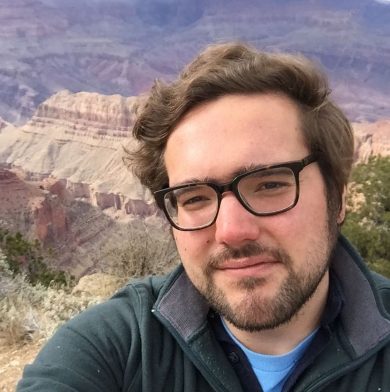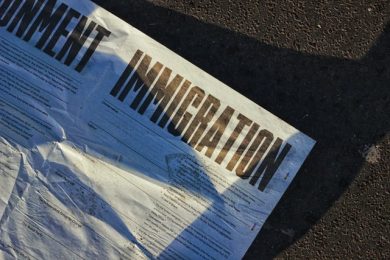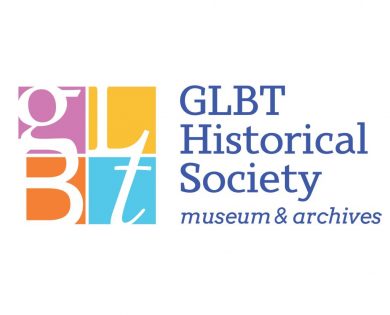Graduate Profile: Aaron Aruck, History Doctoral Student

Aaron Aruck is a PhD Candidate in the History Department at UC Santa Cruz. His work examines the history of public health, focusing in particular on the Southern Border of the United States. This year, he was selected as a THI Summer Public Fellow.
In January, we spoke with Aruck about his current work and what he identifies as the “public health asymmetries of the border region.” He first became interested in researching the role that sexuality plays in policing the border between the United States and Mexico when he was working as a legal assistant with the National Center for Lesbian Rights. We also talked about the ongoing impacts serving as a THI Fellow prior to this year has had for his work.
Hey Aaron! We appreciate you taking the time to tell us a bit about your work and experience. To begin, can you give us a brief outline of what your research interests are? How would you describe your academic work??

My research explores how the twentieth-century U.S.-Mexico border evolved into a space of sexuality-based immigration exclusions. Drawing on archival records mostly from Mexico City, I contend that the mid-century Anti-Venereal Disease Campaign, a public health initiative co-funded by the U.S. and Mexico to prevent the spread of venereal disease in the border region, was a key binational state project that allowed both countries to delineate and police the excludable categories of the homosexual and gender non-conforming. My work also takes up public health asymmetries in the border region, particularly related to venereal disease tracking and treatment infrastructures that would go on to shape the social and physical landscape of northern Mexico.
It definitely seems like there is a really strong emphasis on publicly-engaged scholarship in your work. How do you think that approaches which engage the public in unconventional ways invite historians to reflect on the discipline itself? What do you find to be so important about this aspect of academic work?
Especially in regard to the history of public health, I think there is an impulse to project a sort of empiricism and objectivity onto the past actions of public health agencies that obscures the fact that people working in these agencies were biased decision-makers who made choices that were not necessarily inevitable. I think that research that traces why sexually-transmitted infections have long since been grounds for immigration exclusion in the U.S. context (including the HIV immigration entry ban, which was only taken off the books in 2010) helps us take a critical look at what our immigration laws were designed to do, and ask tough questions about whether or not they actually accomplish those goals or are really just discriminatory artifacts. Scholarship really has to engage the public if we are to make sense of why things like immigration laws are the way they are today, and that engagement I think reinforces for historians at least that nothing is inevitable, and instead the result of cumulative individual decision making.
Last summer, you were a THI Summer Public Fellow with the Gay, Lesbian, Bisexual, Transgender (GLBT) Historical Society in San Francisco. In broad strokes, how would you describe your experience working with this organization? What would you like readers to know about the GLBT Historical Society?

The GLBT Historical Society is amazing! As an archive they have really extensive and diverse collections, and I learned how painstakingly deliberative and challenging it is to organize and summarize archival collections that resist any easy or clear categorization. It was interesting as a historian to participate in the behind-the-scenes process of organizing and detailing archival collections instead of just examining those collections as a researcher working through the finding aids that archivists produced for you as a researcher. I would also like to say that the GLBT Society has really terrific items available digitally (and organized thematically!) that you can access online while most archives are closed for pandemic reasons.
It sounds like you worked on some really interesting collections, including many which are digitized. What was interesting and important to you about the particular materials you found yourself working with?
I think for a lot of people who love archives, or just old items generally, the biggest allure of going into the archive is being able to in some ways be in touch (literally) with the past. Given the pandemic and the fact that many archives are not open to the public currently, I found the oral history transcriptions and recorded interviews at the GLBT Historical Society particularly powerful sources that gave you the same archival rush of wading through history from the comfort and safety of your own computer. Sources like oral history transcripts from gay GIs who went on first dates and interviews with people who worked the nightlife circuit in San Francisco in the 1960s powerfully reminded me that the current moment of isolation and loneliness that we all are experiencing is temporary, and we’ll be back to having gin and tonics together soon.
In addition to working with the GLBT Historical Society last summer, you’ve also served as a Public Fellow with Badge List and were a part of the 2018 cohort of the SSRC-DPD Program. Taking all of this into account, how have these experiences helped you to generate your work and grow as an academic?
I think all of these research experiences have really helped me keep an open mind about how my research can look. I never thought I’d have a table with numerical data in my dissertation, but I am somewhat more comfortable engaging the quantitative now. I also think that both of these research opportunities helped the exploratory process; I had no idea some critical document collections existed until I got to visit Mexico City archives in a low-stakes kind of way and pass the afternoon just looking at collections that piqued my interest.
